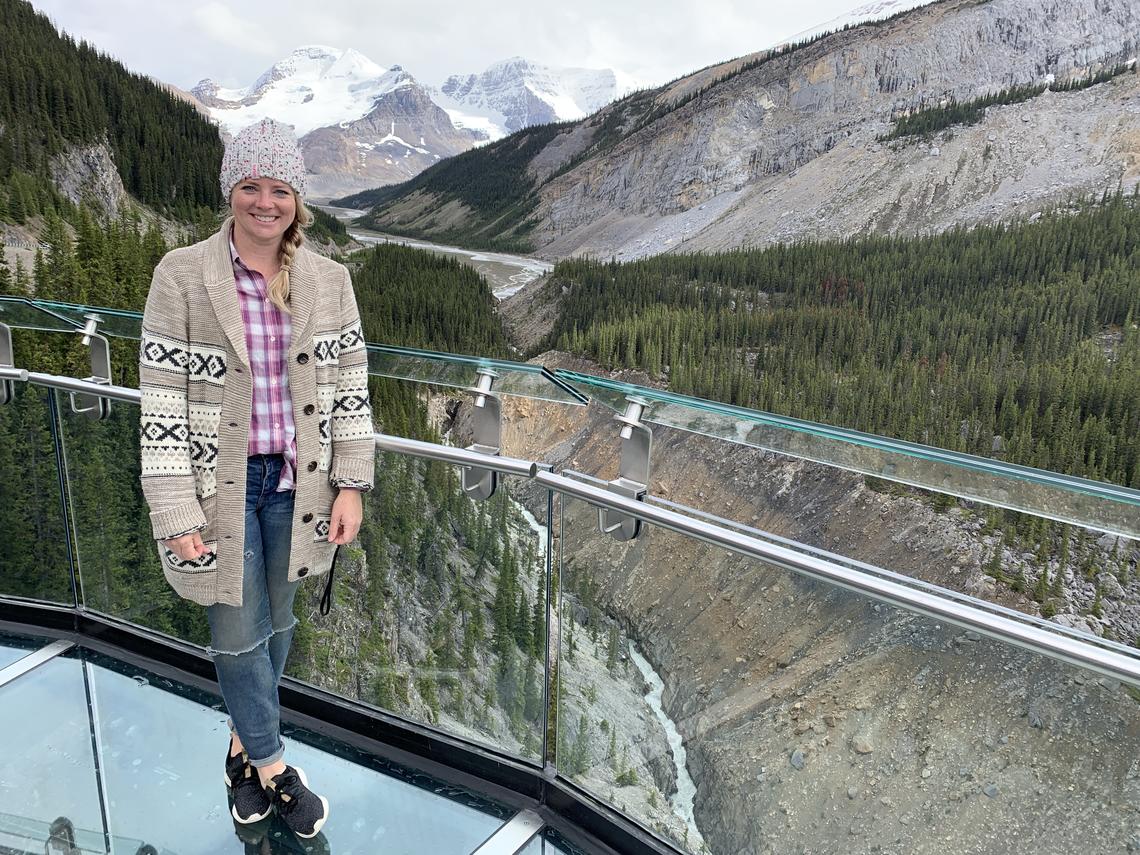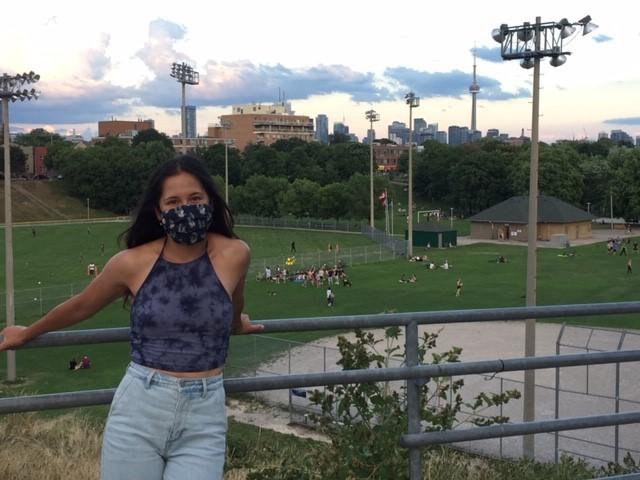Aug. 25, 2020
Alumni around the world reflect on life and times in the age of COVID-19

Do you know a member of University of Calgary’s extended family who has made a significant contribution during the COVID-19 pandemic to improve lives or build community? We’ve launched a content series titled COVID-19 Heroes — a rich record of one of the most difficult periods in our world’s history and how members of the UCalgary community have responded. Tell us about the human beneath the hero and what they’ve done, or are currently doing, and we will try to include your submission in an upcoming alumni newsletter and on one of our social channels.
A menswear boutique in New York pivots to selling face coverings. An alumna living in France discovers the power of close relationships. A rocket scientist reflects on the true value of so many things we take for granted. These recent experiences are just a few examples of how UCalgary alumni are putting everything they’ve got into their businesses, lives and relationships during the COVID-19 pandemic.
Here’s a snapshot of what some of our alumni — from New York City and San Francisco to the French Alps and Calgary — have been experiencing.
Not so fine and dandy
Wedged in an area of Manhattan known as Hell’s Kitchen (between Times Square and the Hudson River) is a 400-square-foot bespoke boutique jammed with men’s accessories, from funky bow ties to snappy waistcoats. Established in 2008 by alumnus Enrique Crame III, BA’02, and partner Matt Fox, Fine and Dandy was almost on life support when the pandemic battered New York City, writes Crame in an email.

In a conversation with a bow tie manufacturer, Crame remembers lamenting his shop’s poor sales. The manufacturer mentioning that she was working on some face masks. Crame asked her to make Fine and Dandy a few, using remnants from their ties and bow ties. The initial batch sold out in 90 minutes.
“For much of April and May, she would send us a new batch about every 10 days and they would sell out in a day or two,” writes Crame. “Lately, they account for 90 per cent of our sales and they literally are keeping the lights on for both our business and our manufacturer. We've always tried to use local manufacturers, and this has proven to be invaluable as we've pivoted in our product offering.”
Pre-physical distancing
A few years ago, when we first met Katalina Szewczyk, BComm’10, she was working for JLB Expertises in Senegal. But when lockdown occurred, Szewczyk was volunteering in the French Alps with — it turns out — only a dog to hug.
“That’s when I realized the value of human touch and how critical that physical connection is for my happiness,” she writes. “Although I was with a host family, I felt alone and, for the first time in my life, I experienced two panic attacks.”

Szewczyk tried to keep herself entertained by watching silly comedies and documentaries on Buddhism, but, she adds, “What I really learned was the importance of community and the power of close, intimate relationships, as well as the value of human touch.”
A book is born
After several years of living in the U.S., Renée Francis, BA’06, MBA’16, still self-identifies as a “friendly Calgarian living in San Francisco,” where, until COVID-19 happened, people “weren’t so friendly ... but now, with everyone taking morning walks, people have started saying ‘hello’ and nodding. I hope we keep that.”
Francis admits she hasn’t perfected a sourdough recipe or mastered a new language, but she did publish a book, along with fellow UCalgary alumna Christine Dagenais, MBA’11, “after three years of collaboration.” The duo never planned to launch their labour of love, The Intentional MBA, during a pandemic, but Francis says they’ve soldiered on and discovered “all sort of ways to promote our efforts virtually. Just as we were told in so many MBA classes — innovation usually comes from challenging circumstances!”
As a professional communicator, Francis has been wildly busy. “Crisis highlights the need for leadership, timely information people can trust, and the need for us all to show up with our humanity front and centre,” she says. “We need to be connected to one another and understand how we’re all contributing to work that matters.
"I hope an upside of the pandemic is that we continue to recognize that we belong to each other, and that when some of us aren’t well, we’re all not well.”
Why equate creativity with productivity?
Local artist Katie Green, BFA,’13, most noted for her beloved murals in the Beltline and East Village, has treated the last few months as a “gift . . . of slowing down,” she writes. Watching most of her creative projects get scrapped due to travelling restrictions was not easy for Green. She’s taken the time, however, to explore her sense of self, without the driving force of worth being attached to productivity.
Green remains optimistic, musing over the pandemic’s fallout. “The virus asks us to consider the unique ways we handle stress, safety, health and communication,” she writes. “I am hopeful that this pandemic creates a culture of caring — that we see ourselves as a part of a larger whole.”
Life's little luxuries
An aerospace engineer and avid explorer, Natalie Panek, BSc (Eng)’07, remembers, most markedly, where she was on March 14: lying in the sun on a rock at Ontario’s Torrance Barrens Dark Sky Preserve, where she was out for a day hike.
“Who would have thought that lying on a rock would soon seem like the biggest luxury?” marvels the rocket scientist who builds space robotics. “That was the first realization of so many small moments, often taken for granted, that are luxuries. For me, these luxuries included testing space robots at work, speaking engagements, outreach and, most of all, spending time outdoors.
"With many parks and outdoor spaces closed, I reverted to both armchair exploration and everyday exploration where I could. I lived vicariously through any and all adventures on Red Bull TV. And I did more simple science with batteries, magnets and copper wire than I ever thought possible … realizing that, sometimes, the most important luxuries are enabled easily by curiosity and appreciation for the small things.”
Defining leadership
Lisa Shelley, BComm’06, entrepreneur and CEO of Neal’s Yard Remedies, admits to having some “dark and scary days at the outset of this pandemic,” when she worried if her organic skincare company would survive.

Besides skincare, the company quickly boosted its stock of hand sanitizer and soap, and began having daily Zoom staff meetings and virtual happy hours. On a personal front, Shelley invited others to join her walking challenge, spent more time cooking healthy meals, cleaned out her world of clutter, and tried to be creative in how she “navigated the time and space of uncertainty.”
Writes Shelley: “That’s not to say we came out perfect and unscathed; but a leader isn’t just a leader when things are good. I wanted to be a leader that I could be proud of when I look back in five or 10 years from now. I found strength in authenticity, acknowledging the good days and the bad, not only for myself, but for my team and my business.”
Learning to slow down
Another local entrepreneur, Lara Gilbertson-Hudson, BA’06, owner of Stinky Bunny Children’s Fashion, admits business has “taken a hit,” but she is determined to cherish the small wins.

“In many ways, I feel blessed to have the opportunity to slow down and enjoy more time with my young family,” she writes. “It has been surprisingly wonderful to have fewer commitments and greater flexibility throughout the day. Plus, I now get to hang out more with the horses!”
Pondering an existential crisis
A former Calgarian, film director Gillian McKercher, BSc (Eng)’13, now lives in Toronto where, pre-pandemic, she could — and did — spend hours each day commuting.

But not recently. “Throughout COVID, my experience of time is slower, deeper and richer,” writes the chemical engineering grad and the woman behind the 2018 film, Circle of Steel. “On one hand, this makes our day-to-day existence more challenging — I have less distractions and illusions that I’m being productive. Overall, I’d say that I now have the time to really consider the world — intellectually and emotionally.”
In doing so, McKercher circles back to the existential crisis that she believes the world is in. These are, indeed, the questions she ponders: “How will the WHO [World Health Organization] sustain its essential duties when the United States has deemed the organization non-essential and withdrawn its funding? How do municipalities divide their time between essential emergency medical services and the equally essential civil rights reforms that ask for the defunding of police?
"On a personal scale, I’ve had to ask myself whether my voice as a filmmaker is essential to this moment, or at all.”
As for lessons the pandemic has taught her, McKercher admits: “I’ve learned that I have very little control in the world, but to live as though everything I do matters. For example, I have almost no control over the global pandemic and the geopolitical fallout, but I can sanitize my hands and wear a mask whenever I go out.
"I can’t personally end racism, but I can listen, support change, show up to events and criticize my own complicity. I can’t control global supply chains, but I can minimize my spending and consumption habits. I’ve learned that the most important change a person can make is their attitude. Mine has fluctuated a lot throughout the pandemic!”
Becoming a techno whiz
In the past few months, local fitness legend and founder/owner of Heaven’s Fitness, Helen Vanderburg, BPE’79, watched her three businesses shut down completely. Having resisted social media and new forms of technology for years, Vanderburg was forced to change her attitude and skill set and, in four months, became the company’s video producer and social media content provider. Now comfortable with Zoom, Facebook Live, private Facebook pages, YouTube, Instagram Live and IGTV, Vanderburg is about to launch an online “on demand” fitness program, as well as offer online instructor-training courses.
As for silver linings — yes, Vanderburg may well be a new techno whiz, but “it’s working from home and having more face to face time with [her] family,” that’s been the true gift for her.







